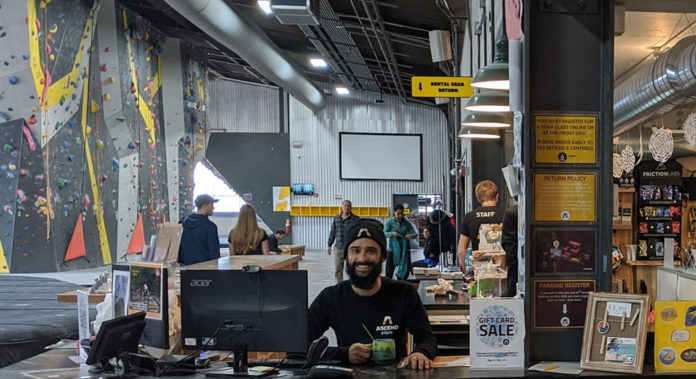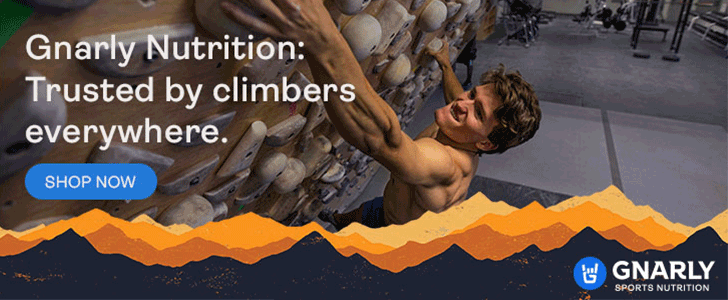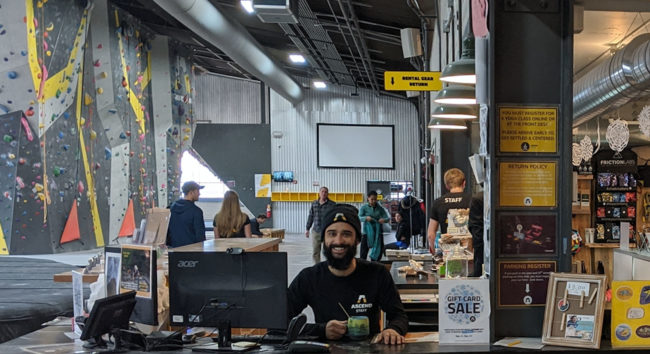
Name: Wade Desai
Title: Director of Climbing at ASCEND
Location: Pittsburgh, Pennsylvania
Behind the Desk is an ongoing series that interviews people who work in the climbing industry. For this installment, we linked up with Wade Desai, who manages a vast assortment of duties and responsibilities at ASCEND in Pittsburgh. Desai is a lifelong climber, having first been captivated by the outdoors as a child (He aptly states, “I always say, with climbing, there’s a type of person that looks to the top of something—whether it’s a tree or a cliff or whatever—and they think, ‘I want to be up there!’”).
Desai’s interest in climbing led him to construct a homewall in his backyard as a teenager and later to frequenting a number of different gyms. However, there’s much more to Desai’s story—including a totally separate career track in the medical field. So, perhaps that’s the best place to start…
BURGMAN: Beyond learning how to climb as a child, when did it become something that you wanted to do as a career?
DESAI: It was never going to be something of a career—I always just enjoyed it as a hobby. And when I left high school, I was very fortunate and very privileged—I was in a good place and I had a lot of opportunity. I went to the University of Pittsburgh and I ended up selecting a pre-med track. And then I ended up going to med school, going to residency. And the whole time I was climbing, and climbing made me happier than anything in the entire world. But I never thought about how I could make climbing into a career because at the time I was just thinking, ‘Well, I’m going to be a doctor.’ I practiced [medicine] for about a year and a half and just didn’t have as much interest in the end product as I did when I got into it—when I was 17 years old, 18 years old.
But when I was finishing my residency, I got more involved with ASCEND because they had just opened [2017]. Since I was plugged in with the climbing community, I was able to get in with ASCEND, specifically with slacklining. From there, it snowballed, one thing after another, and I realized that at ASCEND—with my skill set and my persona, everything about it—I was instilling more wellness in people’s lives, especially in the outdoor realms, than it often felt like I was in medicine. So, after a few years of thinking about it and weighing the big change, I made the flip: I quit medicine altogether and decided not to renew my license and I went full-time with ASCEND—behind the front desk at first, scrubbing toilets and greeting customers. Then I worked my way up.
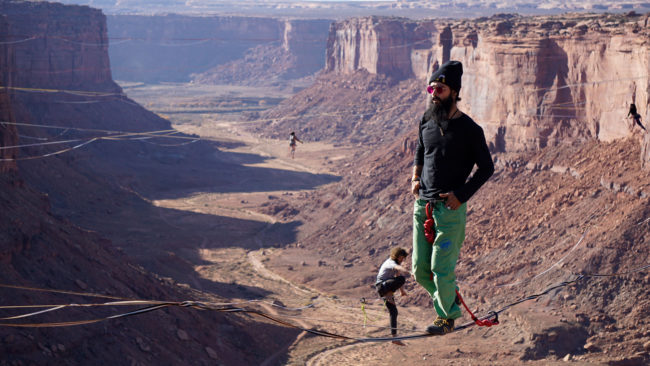
It does sound like you really enjoy the work at ASCEND—I can hear it in your voice.
I really enjoy the fulfillment, and every day I feel privileged for this role: climbing corporate strategies and building climbing communities. It’s a new version of Corporate America. I get to say I’m a ‘professional climber’ and live this dream-like job.
The medical industry is massive. The climbing industry is obviously much, much smaller. But as climbing grows rapidly, are there any lessons to be learned from the medical industry’s growth?
I think it’s inevitable with any commercialization process that you’re going to have a ‘too big’ entity that sort of works against the smaller parts within it. And I think that will happen with climbing; it’s already happening, in some sense, in that there are already so many climbers in the outdoor world that our areas are getting impacted more than ever.
But one of the incredible things about ASCEND, specifically: They don’t want to grow to become a mega-corporation climbing company. So, that helps me with all the dissuasion of losing touch with the customer and the climbers that form the community. Knowing that’s not going to happen here eases my mind within my little bubble in my little world. And ASCEND picks a lot of battles that are very close to my heart in that realm.
For example, Gym-to-Crag is very important to us. There was a conversation when ASCEND opened: ‘Hey, we’re going to have a responsibility here in playing a role in introducing countless climbers to their first experience of climbing, and very likely leading them to an outdoor climbing experience after.’ That’s why we have an outdoor program department, so we can exert some level of influence with the proper things that we’ve learned over our combined years of experience.
So, you must feel that there is a right way and a wrong way for a gym to introduce people to outdoor climbing. Is the gym industry doing enough, in that regard?
I think one of the natural parts of any moment when you start to charge money in exchange for services is that you lose the natural mentorship and apprenticeship model that built it—in this case, climbing. So, I think there is an element of balancing the business. I don’t think that every gym is fortunate enough to have a staff or community members that they can incorporate into their models to be able to do that; a lot of gyms are just trying to pay a livable wage to their employees and trying to keep the lights on. So, I definitely think there are facilities out there that could do a better job—there are companies that maybe don’t even recognize that role because they are just operating a gym in their mind, a fitness facility.
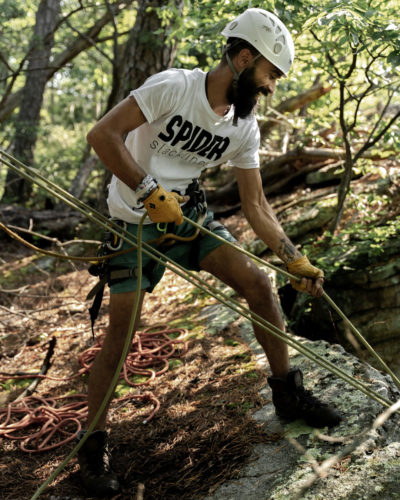
Aside from working on the outdoor guiding and Gym-to-Crag stuff, what else does a Director of Climbing role entail?
All of the indoor programming—all the classes, workshops, personal training, climbing instruction, groups and organizations that are involved, including lately Adaptive climbing. I also run all of our slacklining programming, which is really near and dear to my heart. I also do the staff training that is related to climbing. And I also do a lot of the safety and risk mitigation for the gym—checking anchors, installing anchors, etc. Basically all the stuff that isn’t routesetting because we have a whole different department for routesetting.
I get the sense that most gyms—heck, all gyms—would like to amp up their adaptive climbing offerings and opportunities. Is there anything that other gyms could learn from your experience growing adaptive programming at ASCEND?
It started with adaptive events—we would have them at ASCEND, and I loved to be there, so I would always schedule myself. And we’d have volunteers. And so we got to know people a little bit more that way. It wasn’t like I saw something happening and thought, ‘OK, now I have to do X, Y and Z.’ It was just a natural process, almost like a kid making a new friend. And one thing led to another, before we knew it we had a whole supply of adaptive equipment, and this year we held a big event on July 26, the anniversary of the Americans with Disabilities Act. Sometimes the ideas that end up forming community are just laid out in front of you.
Finally, you mentioned wellness earlier, and I’m curious to hear what you think a climbing gym can do—unique from other types of facilities—to help facilitate and promote wellness.
There’s a lot of ways to actively instill wellness, from a facility like ASCEND to our community (members, staff, customers, etc.), and one of the best ways is through exemplary individuals. I think a lot of people’s behaviors are most motivated when it originates internally, and funny enough, some of the strongest inspirations for that internal flame can be our perceptions of other people. I think ASCEND does an above average job at harnessing talent and authenticity, which in turn fills our facilities with countless individuals to derive inspiration from. Whether it’s a yoga instructor who demonstrates fantastic breathwork or a climbing guide that knows how to teach anyone how to tie a knot, ASCEND is full of people who you can look at and say to yourself, ‘Dang, I sort of want to be like them because…’”
I might be a bit pessimistic in this instance, but I think any time a human tells someone else how to live their life in regards to wellness, there’s an underlying element of hypocrisy because, of course, no person is perfect. But in the context of the climbing community, and simply being around people who are really able to let parts of themselves shine, it ends up causing an exponential spread of the very same lessons you’d fail to teach if lecturing them at someone.
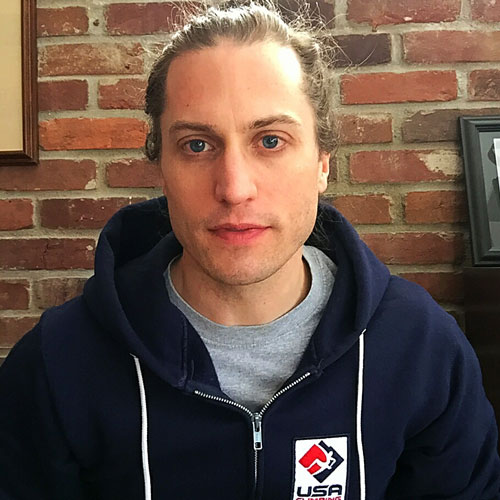
John Burgman is the author of High Drama, a book that chronicles the history of American competition climbing. He is a Fulbright journalism grant recipient and a former magazine editor. He holds a master’s degree from New York University and bachelor’s degree from Miami University. In addition to writing, he coaches a youth bouldering team. Follow him on Twitter @John_Burgman and Instagram @jbclimbs. Read our interview Meet John Burgman, U.S. Comp Climbing’s Top Journalist.




